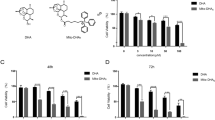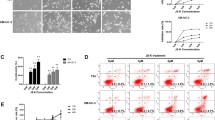Abstract
Nitric oxide-releasing non steroidal anti-inflammatory drugs (NO-NSAIDs) are a promising class of compounds that cause cell cycle perturbations and induce apoptosis in cell lines from different tumors. We investigated the activity of a recently developed NO-NSAID (NCX 4040) in bladder cancer cell lines (HT1376 and MCR). Cells were treated with different drug concentrations for different exposure times. Cytostatic and cytocidal activity was tested by SRB assay and apoptosis was evaluated by TUNEL analysis, ANNEXIN V assay and fluorescence microscopy. To further investigate the cell death-inducing mechanisms of NCX 4040, we analyzed gp-170, caspase expression and mitochondrial membrane potential (Δ Ψ) depolarization. NCX 4040 showed a striking cytocidal activity in both cell lines, reaching LC50 at a 10-μ M and 50-μ M concentrations in HT1376 and in MCR cells, respectively, after an exposure of only 6 h followed by an 18-h washout. Apoptosis was triggered in up to 90% of cells and was associated with active caspase-3 expression and Δ Ψ depolarization in both cell lines after a 6-h exposure. In conclusion, NCX 4040, which probably causes apoptosis via a mitochondrial-dependent mechanism, could prove to be a useful agent for improving bladder cancer treatment.
Similar content being viewed by others
References
Tsao AS, Kim ES, Hong WK. Chemoprevention of cancer. CA Cancer J Clin 2004; 54: 150–180.
Cote RJ, Datar RH. Therapeutic approaches to bladder cancer: Identifying targets and mechanisms. Crit Rev Oncol Hematol 2003; 46: 67–83.
Raghavan D. Progress in the chemotherapy of metastatic cancer of the urinary tract. Cancer 2003; 97(8 Suppl): S2050–S2055.
Bellmunt J, de Wit R, Albiol S, Tabernero J, Albanell J, Baselga J. New drugs and new approaches in metastatic bladder cancer. Crit Rev Oncol Hematol 2003; 47: 195–206.
von der Maase H. Current and future perspectives in advanced bladder cancer: Is there a new standard? Semin Oncol 2002; 29(1 Suppl 3): S3–S14.
Sternberg CN. Gemcitabine in bladder cancer. Semin Oncol 2000; 27(1 Suppl 2): S31–S39.
Sabichi AL, Lippman SM. COX-2 inhibitors and other nonsteroidal anti-inflammatory drugs in genitourinary cancer. Semin Oncol 2004; 31(2 Suppl 7): S36–S44.
Baek SJ, Wilson LC, Lee CH, Eling TE. Dual function of nonsteroidal anti-inflammatory drugs (NSAIDs): Inhibition of cyclooxygenase and induction of NSAID-activated gene. J Pharmacol Exp Ther 2002; 301: 1126–1131.
Shiff SJ, Qiao L, Tsai LL, Rigas B. Sulindac sulfide, an aspirin-like compound, inhibits proliferation, causes cell cycle quiescence, and induces apoptosis in HT-29 colon adenocarcinoma cells. J Clin Invest 1995; 96: 491–503.
Giardiello FM, Hamilton SR, Krush AJ, et al.. Treatment of colonic and rectal adenomas with sulindac in familial adenomatous polyposis. N Engl J Med 1993; 328: 1313–1316.
Steinbach G, Lynch PM, Phillips RK, et al.. The effect of celecoxib, a cyclooxygenase-2 inhibitor, in familial adenomatous polyposis. N Engl J Med 2000; 342: 1946–1952.
Castelao JE, Yuan JM, Gago-Dominguez M, Yu MC, Ross RK. Non-steroidal anti-inflammatory drugs and bladder cancer prevention. Br J Cancer 2000; 82: 1364–1369.
Soll A. Pathogenesis of nonsteroidal anti-inflammatory drug-related upper gastrointestinal toxicity. Am J Med 1998; 105(5A): 10S–16S.
Segasothy M, Samad SA, Zulfigar A, Bennett WM. Chronic renal disease and papillary necrosis associated with the long-term use of nonsteroidal anti-inflammatory drugs as the sole or predominant analgesic. Am J Kidney Dis 1994; 24: 17–24.
Kashfi K, Ryan Y, Qiao LL, et al.. Nitric oxide-donating nonsteroidal anti-inflammatory drugs inhibit the growth of various cultured human cancer cells: Evidence of a tissue type-independent effect. J Pharmacol Exp Ther 2002; 303: 1273–1282.
Tesei A, Ricotti L, Ulivi P, Medri L, Amadori D, Zoli W. NCX 4016, a nitric oxide-releasing aspirin derivative, exhibits a significant antiproliferative effect and alters cell cycle progression in human colon adenocarcinoma cell lines. Int J Oncol 2003; 22: 1297–1302.
Bak AW, McKnight W, Li P, et al.. Cyclooxygenase-independent chemoprevention with an aspirin derivative in a rat model of colonic adenocarcinoma. Life Sci 1998; 62: 367–373.
Huguenin S, Vacherot F, Fleury-Feith J, et al.. Evaluation of the antitumoral potential of different nitric oxide-donating non-steroidal anti-inflammatory drugs (NO-NSAIDs) on human urological tumor cell lines. Cancer Lett 2005; 218: 163–170.
Huguenin S, Vacherot F, Kheuang L, et al.. Antiproliferative effect of nitrosulindac (NCX 1102), a new nitric oxide-donating non-steroidal anti-inflammatory drug, on human bladder carcinoma cell lines. Mol Cancer Ther 2004; 3: 291–298.
Royle JS, Ross JA, Ansell I, Bollina P, Tulloch DN, Habib FK. Nitric oxide donating nonsteroidal anti-inflammatory drugs induce apoptosis in human prostate cancer cell systems and human prostatic stroma via caspase-3. J Urol 2004; 172: 338–344.
Skehan P, Storeng R, Scudiero D, et al.. New colorimetric cytotoxicity assay for anticancer-drug screening. J Natl Cancer Inst 1990; 82: 1107–1112.
Monks A, Scudiero D, Skehan P, et al.. Feasibility of a high-flux anticancer drug screen using a diverse panel of cultured human tumor cell lines. J Natl Cancer Inst 1991; 83: 757–766.
Zoli W, Ricotti L, Tesei A, et al.. Schedule-dependent cytotoxic interaction between epidoxorubicin and gemcitabine in human bladder cancer cells in vitro. Clin Cancer Res 2004; 10: 1500–1507.
Tesei A, Ulivi P, Fabbri F, et al. In vitro and in vivo evaluation of NCX 4040 cytotoxic activity in human colon cancer cell lines. J Transl Med 2005; 3: 7.
Fiorucci S, Mencarelli A, Mannucci R, et al.. NCX-4016, a nitric oxide-releasing aspirin, protects endothelial cells against apoptosis by modulating mitochondrial function. FASEB J 2002; 16: 1645–1647.
Fiorucci S. NO-releasing NSAIDs are caspase inhibitors. Trends Immunol 2001; 22: 232–235.
Khwaja F, Allen J, Lynch J, Andrews P, Djakiew D. Ibuprofen inhibits survival of bladder cancer cells by induced expression of the p75NTR tumor suppressor protein. Cancer Res 2004; 64: 6207–6213.
Pruthi RS, Derksen E, Gaston K. Cyclooxygenase-2 as a potential target in the prevention and treatment of genitourinary tumors: A review. J Urol 2003; 169: 2352–2359.
Wink DA, Vodovotz Y, Cook JA, et al.. The role of nitric oxide chemistry in cancer treatment. Biochemistry (Mosc) 1998; 63: 802–809.
Rigas B, Kashfi K. Nitric-oxide-donating NSAIDs as agents for cancer prevention. Trends Mol Med 2004; 10: 324–330.
Author information
Authors and Affiliations
Corresponding author
Additional information
This study was supported by Istituto Oncologico Romagnolo, Forlì, and by the Italian Ministry of Health, 2002.
Rights and permissions
About this article
Cite this article
Fabbri, F., Brigliadori, G., Ulivi, P. et al. Pro-apoptotic effect of a nitric oxide-donating NSAID, NCX 4040, on bladder carcinoma cells. Apoptosis 10, 1095–1103 (2005). https://doi.org/10.1007/s10495-005-0619-7
Issue Date:
DOI: https://doi.org/10.1007/s10495-005-0619-7




